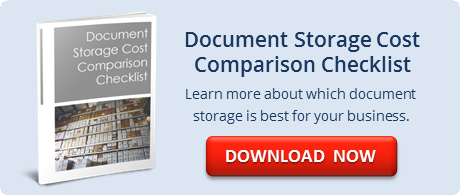Why It’s Time to Prioritize Secure Document Storage Today
Wed, Sep 28, 2016
By: Jim Beran

The world today is practically overflowing with information. From mailed publications and credit card offers to emails and digital data, document and information management can be overwhelming.
That said, it’s all the more reason why records management professionals need to prioritize document storage strategies. After all, while you may have tried "winging it" with document storage in the past, that just won’t cut it any more.
Making document storage a business priority
The first step in making records storage a business priority is realizing how essential it is to your company’s reputation and credibility. In fact, documents and files such as payroll records, strategic business plans, customer or patient lists, insurance records, contracts, licenses and permits, and employee information can all be considered sensitive information, and all are common in many types of business settings.
If you run a health clinic or dental office for instance, consider how important it is that you maintain accurate and confidential health records for your patients. The same goes for financial institutions harboring customers’ personal banking information.
Keeping good records and storing them appropriately is part of business compliance, and also keeps your company more organized. In fact, maintaining secure document storage is not just a good idea; it's essential to business compliance, office workflow, and client relations.
The drawbacks of DIY document storage
Many companies first start out by storing important documents on-site, such as in storage boxes or filing cabinets. Other businesses may routinely add documents to an off-site storage unit, such as those designed for household goods or vehicles. However, there are significant drawbacks to these types of storage plans:
- No protection from the elements. Do-it-yourself or you-store-it storage units are rarely insulated against extreme heat or cold, severe weather or water damage, and fire. Paper documents and even computers or hard drives stored in these units are at risk of mold and mildew, pests, and other damage. Even in-house storage options aren’t totally safe from accidents like fires, fire sprinklers, or flooding.
- No safeguards against theft. Mini storage units are notoriously prone to larceny, and even in-house storage offices can be compromised by rogue employees or burglars.
- No protection against system failure. Sometimes, even your own internal records management system can fail you. If something happens to damage your important documents and you don’t have a second copy or digital backup, there’s not a lot you can do to rectify the problem.
The benefits of working with a records management partner
If you find that your business is growing, but your records storage plan remains stagnant, out-of-date, or even poorly managed, it may be helpful to partner with a document storage professional. The benefits are many:
- Safe, controlled storage areas. Professional document storage partners make it a priority to store paper files and electronic devices in an environmentally controlled setting, where information is protected from excess heat, cold, moisture, and fire.
- Easy migration to digital storage. Certified professionals can also help securely convert paper files to digital cloud-based storage, offering a reliable and space-saving option when it comes to accessing information.
- Certified retention specialists. Not only will a records storage partner help maintain the integrity of your file storage system, but will assist with secure document destruction when the time is right.
Your business certainly places a high priority on its clients, customers, or patients. That’s why it’s time to prioritize your records storage solutions to make them as secure and protected as possible, now and in the future. Learn more about which document storage solutions are right for your company below.